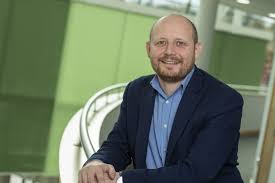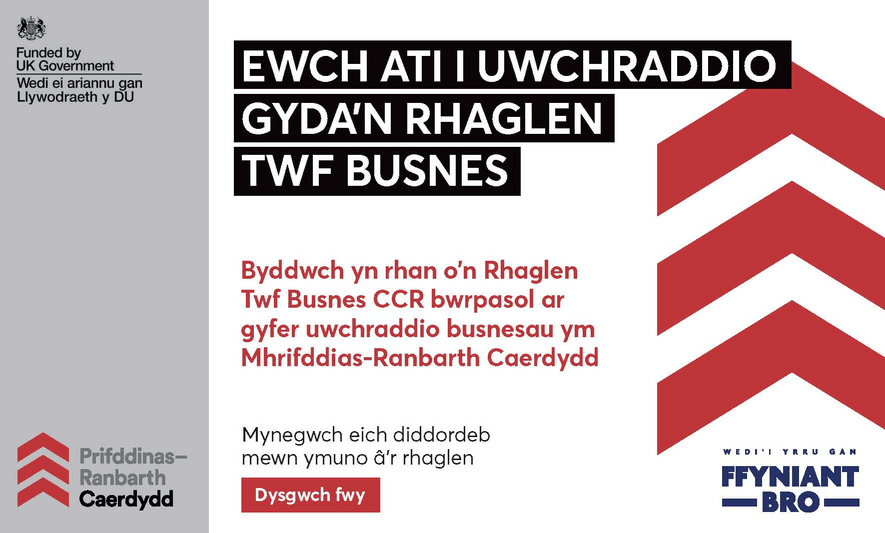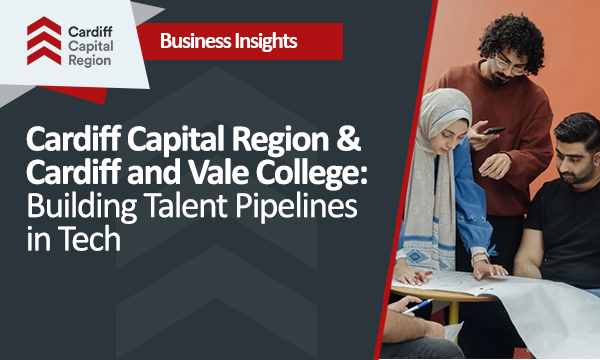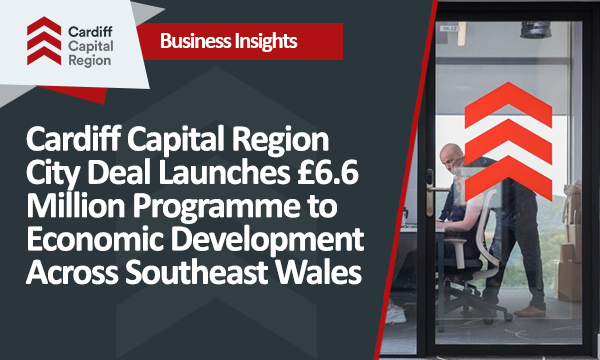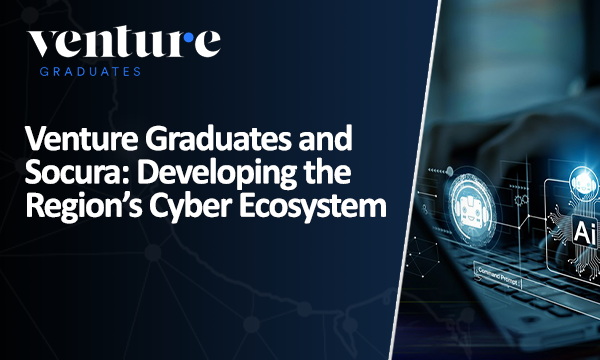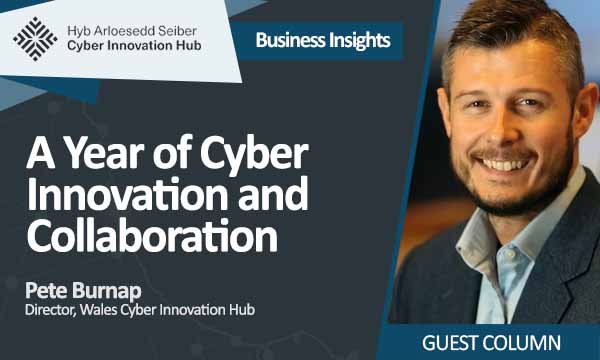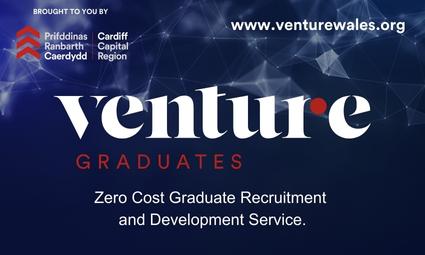Rhys Thomas, Chief Operating Officer of Cardiff Capital Region City Deal, spoke with Mark Powney, MD at Business News Wales
Tell us about yourself, what is your background and what does your day to day role consist of?
I’m a Welshman from West Wales, came up to the Cardiff Capital Region to go to university 20 years ago and I’ve never left. I’ve spent most of my career working at Cardiff University in various roles, but the latter couple of years were really focussed on innovation and economic development and how the university’s contribution to the wider society and economy could be maximised.
No two days are alike, but the ultimate aspect of it is to support the governance and administration of the City Deal, while at the same time looking for investment propositions and nurturing them, and putting them through challenge to make sure we make the right investment decisions at the end of the day.
It’s a challenging, interesting time for you…
As for everybody else. Our way of working was turned upside down overnight. We responded positively, we’re into a new groove of working from home. The levels of interest and investment requests haven’t dried up, if anything they’ve increased, and there are some challenges for us in that in terms of how we manage everybody’s expectations.
We saw a range of investment decisions made in early March. Can you give us an update? Where are we with the Housing Investment Fund?
We’ve been progressing the procurement of the technical advisers over the last couple of months and we’ve recently made an appointment. CBRE will advising us how we take forward the viability gap element of the fund. We’re looking forward to that; they’ve got great experience doing similar things across the UK, including the Housing Investment Fund that UK Government introduced for England.
There’s been a lot of conversations taking place with local authorities to prime them to bring forward appropriate sites, so there’ll be more to communicate on this over the next 6-9 months.
Digital connectivity is a priority for all of us in the region, where are we with the roll out of 5G and the advancement of a fibre provision programme?
A lot of work has gone into ensuring that we secure the DCMS project for rural connected communities, that’s focused in the Blaenau Gwent area and Monmouthshire, and we’re working with the consortium partners to try and scope out the wider programme and see if we can make that work.
In terms of the full fibre provision programme across the region, we’re going through the process, understanding where we are with it, where our partners are. Covid has had an impact on this project, partly because of a concern over long-term investment; that’s being worked through at the moment. We’ll be able to progress with it in the near future.
What about the Life Sciences Park?
We’ve done a fair amount of due diligence, the outline business case was considered by the Regional Cabinet on Monday, they’ve approved that and we’re moving forward to the full business case. It demonstrates that CCR is a good place for life sciences and medtech in particular. We’ve got some good strengths in our R&D base, a good supply of the right skill mix required to make this cluster succeed in the future, all the things we knew but have now been validated, so that gives us confidence to progress. We are continuing to develop the underlying business plan for the Life Sciences Park with our joint venture partners. Hopefully we’ll be able to announce a more formal decision on that in the early autumn.
How have these decisions been impacted by the lockdown, or is good progress continuing to be made?
The lockdown hasn’t affected our business continuity at all; we’ve had four investment panel meetings since lockdown, three regional cabinet meetings. Our basic machinery is working well, we’re continuing to work in a different way, it’s not slowing down progress.
Given the huge financial impact businesses have encountered and timing gaps in support packages, have you seen an upsurge in requests for investment?
We’ve seen an upsurge in enquiries, some of them are not appropriate for the City Deal; that’s not to say they were not good or viable projects, they were just not the structure for us to move forward. Some of them were more high risk or requiring more working capital, and that’s not really the space of the City Deal. The City Deal is a 20-year programme looking at economic growth and regeneration. We shouldn’t lose sight of our medium and long-term plans, while working with our partners in UK Government and Welsh Government to ensure some of the more immediate needs are also addressed.
Can you expand on the number of applications that have come forward? Are you seeing more requests for certain types of project?
Since the lockdown our investment panel has considered 14 new submissions, 6 of those have been supported for further consideration and development. There has been a growth in the propositions coming forward in the wider medtech area linked to the health agenda; the business opportunity is greater in those areas at this time arguably.
Are there any types of investment proposal you’d like to attract more of?
We’d be keen to look at more large-scale transformative projects, that would have a bigger impact on the region. We are seeing a lot of businesses coming forward with business specific propositions, but we need to challenge ourselves a bit more as a region; we need to push on a bit harder on some of the larger, more transformative projects.
Can you talk to us about what the evergreen fund for strategic premises is about? Also, investments in fintech and medtech?
The premises fund is something we’ve had on our horizon for a while, the Covid-19 pandemic has just accelerated our thinking behind it. It’s a complementary fund to the Housing Investment Fund; it’s going to be targeted predominantly on industrial and commercial premises, to support our key clusters that we’ve identified in our industrial and economic growth plan. We’ll be looking for developers to come forward with propositions; we’ll provide them with development finance, subject to the rigours of due diligence. We’d be looking to the developers to refinance after they’ve built it and got some tenants in, allowing us to recycle that money into other projects.
With fintech, we’ve agreed to provide £250,000 seed funding to Fintech Wales, which will allow a 9 month programme of essential work to be carried out to establish and evidence the building blocks required to grow the sector’s sustainability in the region. This work will include feasibility assessments to build strategic hubs in Cardiff, Bridgend and Cwmbran. We’re looking to work closely with partners in the private sector, the fintechs themselves and with Welsh Government to see how we nurture and stretch the cluster in the future.
In medtech, there’s been a growth of interest from companies in the sector as I outlined earlier, and I’m pleased to say we’ve agreed an investment in a new technology that is Covid-related, we’ll be able to say more about that in the very near future. We’re also looking to support a few other businesses where their capability will help with future pandemics, so they’ve got a short- term benefit but they’ve also got a resilient, strong forward business plan that we’re quite confident in.
The CCR has stated its 10 priorities for addressing the impact of Covid-19. There’s a lot of focus on new funding interventions; one is setting up a rebuilding local economies challenge programme, what will that deliver for us?
This is something we identified in our Investment Framework last year as a priority for the city region, we’ve been working on it since then. Again, the pandemic has sharpened our thinking around this, it’s now much more focused on how we rebuild our local economies that have been affected quite hard by the crisis. We’ll be engaging stakeholders over the summer to identify what challenges we should be bringing forward, and working with them and others to deliver them for us. We are hopeful we’ll be working closely with our partners at Cardiff University to deliver this programme based on their experiences of Innovate to Save, and building on the experiences the wider government agencies across the UK have had.
All these are interventions targeted at where we don’t know what the solution is but we know what the problem is, and if we open that problem up as a challenge to the community, we should get different actors coming forward with different perspectives of how to address them. It’s being much more open to that innovation and addressing some of the inequalities we face in our communities at present.
The priorities include working with investment partners to create the SME Co-investment Fund, what will this be looking to achieve and what is the timeframe for delivery?
The overarching objective is to create a cluster growth fund to support our key businesses and clusters; we are seeing demand for growth capital for those businesses, who are established but looking to take the next step and transform themselves. It will probably be towards the end of this calendar year, that’s when I’d hope we’d be making that fund live.
What are your hopes for what we’ll have achieved by next year?
I’d hope that by this time next year, a lot of the projects you’ve referred to will be in delivery, people will be able to see the impact of them, they’ll be making differences to our businesses and our communities. We are learning as we go along so we are evolving, the SME Co-investment Fund is a good example of responding to the needs we’re identifying.
Covid is affecting how everyone is working; how is CCR responding, how is everybody communicating and making these decisions?
We’re using a lot of video conferencing, working in a much more agile and flexible way than we’ve done in the past. The relationships are mature relationships and they’ve responded well.



